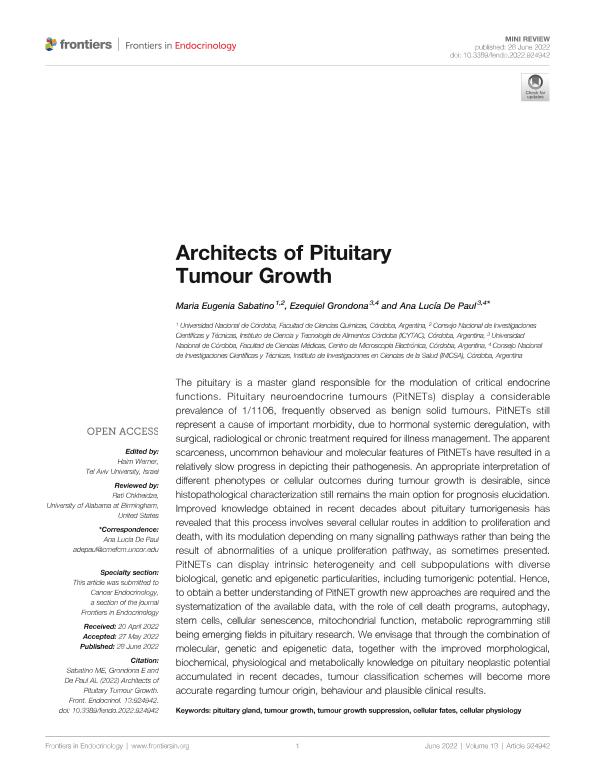Artículo
Architects of Pituitary Tumour Growth
Fecha de publicación:
06/2022
Editorial:
Frontiers Media
Revista:
Frontiers in Endocrinology
ISSN:
1664-2392
Idioma:
Inglés
Tipo de recurso:
Artículo publicado
Clasificación temática:
Resumen
The pituitary is a master gland responsible for the modulation of critical endocrine functions. Pituitary neuroendocrine tumours (PitNETs) display a considerable prevalence of 1/1106, frequently observed as benign solid tumours. PitNETs still represent a cause of important morbidity, due to hormonal systemic deregulation, with surgical, radiological or chronic treatment required for illness management. The apparent scarceness, uncommon behaviour and molecular features of PitNETs have resulted in a relatively slow progress in depicting their pathogenesis. An appropriate interpretation of different phenotypes or cellular outcomes during tumour growth is desirable, since histopathological characterization still remains the main option for prognosis elucidation. Improved knowledge obtained in recent decades about pituitary tumorigenesis has revealed that this process involves several cellular routes in addition to proliferation and death, with its modulation depending on many signalling pathways rather than being the result of abnormalities of a unique proliferation pathway, as sometimes presented. PitNETs can display intrinsic heterogeneity and cell subpopulations with diverse biological, genetic and epigenetic particularities, including tumorigenic potential. Hence, to obtain a better understanding of PitNET growth new approaches are required and the systematization of the available data, with the role of cell death programs, autophagy, stem cells, cellular senescence, mitochondrial function, metabolic reprogramming still being emerging fields in pituitary research. We envisage that through the combination of molecular, genetic and epigenetic data, together with the improved morphological, biochemical, physiological and metabolically knowledge on pituitary neoplastic potential accumulated in recent decades, tumour classification schemes will become more accurate regarding tumour origin, behaviour and plausible clinical results.
Archivos asociados
Licencia
Identificadores
Colecciones
Articulos(ICYTAC)
Articulos de INST. DE CIENCIA Y TECNOLOGIA DE ALIMENTOS CORDOBA
Articulos de INST. DE CIENCIA Y TECNOLOGIA DE ALIMENTOS CORDOBA
Articulos(INICSA)
Articulos de INSTITUTO DE INVESTIGACIONES EN CIENCIAS DE LA SALUD
Articulos de INSTITUTO DE INVESTIGACIONES EN CIENCIAS DE LA SALUD
Citación
Sabatino, María Eugenia; Grondona, Ezequiel; de Paul, Ana Lucia; Architects of Pituitary Tumour Growth; Frontiers Media; Frontiers in Endocrinology; 13; 924942; 6-2022; 1-11
Compartir
Altmétricas




